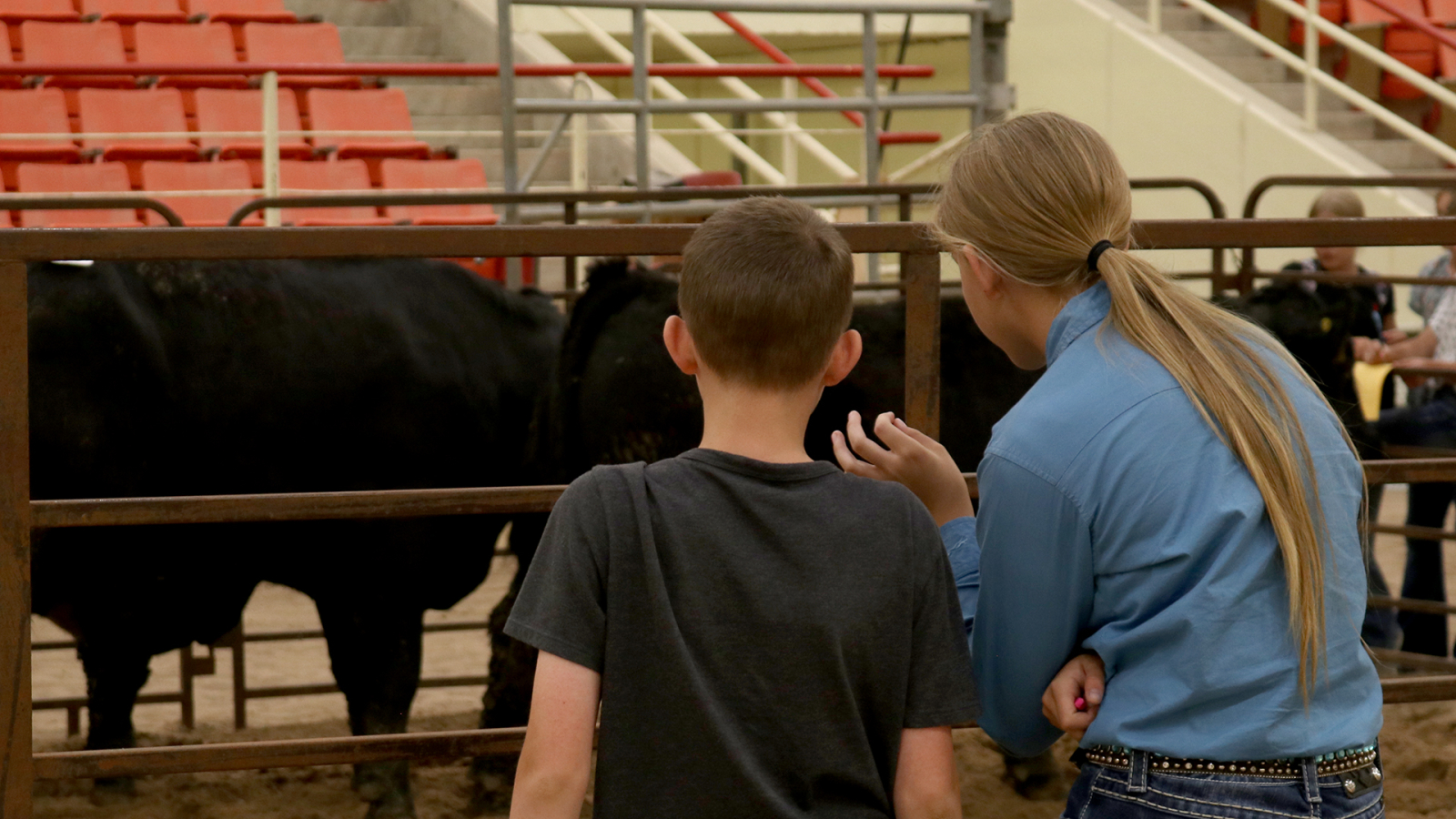Introduction
The Animal Science Extension and Education Specialization is designed for students to be competitive for positions in applied animal science industries. This unique specialization combines scientific coursework with educational design instruction to prepare students for positions in higher education, extension, consulting agencies, corporations, and government organizations. Research focuses on development, integration, application and dissemination of knowledge in animal science, and the teaching–learning process, communication, and leadership.
Program Features
Opportunities for students in this major include:
- Design, conduct, and publish original research in Extension and Teaching in Animal Science.
- Apply concepts of educational theory to address producer needs in animal sciences.
- Synthesize educational literature to develop rigorous program evaluation strategies.
- Critique and evaluation of research literature and effectively synthesize data into an organized oral presentation and written publication.
- Identify and assess teaching methodology applicable in various settings such as distance, face-to-face and blended learning environments for adult learners, higher education, youth learners, extension audiences and others.
M.S. Program
Requirements
- 30 total credit hours: including 20-24 hours of regular coursework.
- Thesis required, equivalent to 6-10 hours.
- Recommended Minor (must complete at least 9 hours in Minor)
- If student wants to work in 4-H extension, they should take 9 credit hours of youth development coursework
- 50% of coursework, including thesis must be Animal Science
Ph.D. Program
Requirements
- At least 90 credit hours: including 12 – 55 hours of dissertation research
- Recommended Minor (must complete at least 9 hours in Minor)
- 50% of coursework, including thesis must be Animal Science
Notable Courses
Diffusions of Innovation: Through an Extension Context (ALEC 809)
A change agent influences innovative decisions in a direction deemed desirable by a business, agency, or organization. Overview of key characteristics of change agents as well as processes by which they influence the introduction, adoption, and diffusion of technological changes in society. Prepares those who are responsible for bringing about change in their community and within the Extension system.
Principles of Adult Education (ALEC 811)
Covering a broad range of topic areas in the field of adult education. Expand understanding of multiple adult learning theories. Connecting theory to practice for those who are responsible for designing and implementing adult education programs for community organizations, leadership organization, and Extension. Focus on how to conduct research in the area of adult education.
Advanced Animal Nutrition (ASCI 821)
Advanced course dealing with the nutrition of domestic animals. In-depth coverage of nutrients, nutrient metabolism, and nutrient requirements. Biochemical and physiological functions of nutrients in life processes.
Introduction to the Development of Distance Education Courses (ALEC 830)
Introduction to practical aspects of developing and facilitating distance education courses. Create and facilitate interaction, assessments, course delivery, assignments, course etiquette and ADA compliance. Develop a distance course module grounded in distance education theory and instructional design principles.
New Technologies in Reproduction (ASCI 841)
Mammalian early embryonic development. Basic aspects of embryology and development biology. Modern technologies in animal reproductive biology, in vitro maturation and fertilization, embryo transfer, cloning, assisted reproductive technologies, transgenic animals, and embryonic stem cells.
Teaching Undergraduate Science (SCIL 888)
The dynamics of undergraduate student learning. Begin to develop the reflective practice of progressive instructional improvement. Interpreting improved educational outcomes in terms of the ability of the instructor to manipulate undergraduate student interactions with instructional materials in an active learning environment.
Other Graduate Courses
These are just some of the courses you will take in our graduate program. Click below to learn more about our other animal science graduate courses.
Explore CoursesAnimal Science Graduate Programs
- Typically completed in 2 years
- 30 credit hours required
(including 6-10 research thesis hours)
- Typically completed in 4-5 years after the B.S. degree or 2-3 years beyond the M.S. degree.
- One half (90 credit hours beyond the B.S. degree) must be completed at the University of Nebraska-Lincoln.
- A professional degree in agricultural science, community development and natural resources at the master’s level
- Flexibility that allows you to design an area of study that addresses your educational goals
- Online courses allowing you to earn the degree remotely
- Animal Science
- Beef Cattle Nutrition
- Extension Education Experience
- Teaching Engagement Experience
Huskers Do Big Things
Program Alumni
- Blaire Speck, Nebraska Extension
- Grace McCarthy, University of Nebraska Foundation
- Ally Pachunka, Ph.D. graduate teaching assistant
- Brooke Parrish, Ph.D. graduate research assistant
Our Research
Our Extension and Education research focuses on development, integration, application and dissemination of knowledge in Animal science, and the teaching–learning process, communication, and leadership.
Explore ResearchOur Faculty
Prior to applying, please contact a specific animal science faculty member in your area of interest. Click below to meet some of our faculty in this specialization.
Meet the Specialization FacultyQuestions? We're Here to Help
If you have questions about any of our specializations within the Animal Science graduate program, please contact a member of our graduate student services team below.


